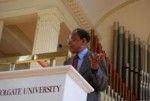Cone Brings Black Theology to Campus

On Thursday, April 16, 2009, Dr. James H. Cone, the Charles A. Briggs Distinguished Professor of Systematic Theology at Union Theological Seminary in New York City, gave a lecture titled “Strange Fruit: The Cross and the Lynching Tree.” This lecture was presented by the Arthur W. ’40 and Anne Hale Johnson Religion and Ethics in America Lecture Series, the Department of Religion and The Brothers of Colgate University.
Cone has been recognized by many universities and has written 11 books and 150 articles and given over 1,000 lectures around the world. Many classes at Colgate include Cone’s work in their curriculum.
Assistant Professor of Philosophy and Religion and Jewish Studies Lesleigh Cushing, who teaches Western Traditions and the Hebrew Bible at Colgate, had her class read Cone prior to attending the lecture.
“I want my students’ perceptions to be unsettled and challenged,” Cushing said in response to why she required her class to attend this lecture.
Challenging beliefs is something Cone strives to do. He challenges people to think outside the traditional norms of religion in the 21st century.
“The theology I studied in graduate school ignored white supremacy and the black struggle against it,” Cone said.
This omission motivated Cone to study theology in a new way.
“How could theologians claim Christian identity and deny white supremacy? I needed to show that Christian identity is impossible in the U.S. without fighting white supremacy and supporting the black struggle for justice. Black theology and black power was my first effort at Union,” Cone said.
He feels that it is his responsibility to interpret the word of the Christian faith for the time we live in today. Cone began his work by looking deeply into the lives of Martin Luther King, Jr. and Malcolm X. He wanted to create a theology that embraced both of these men and thus could be both black and Christian at the same time.
Charles A. Dana Professor of the Humanities and Native American Studies in the Department of Religion Christopher Vecsey was influential in bringing Cone to campus.
“I thought it was an epiphany. Seeing the divine in just the plain old human beings is the epiphany. For him to see Jesus in the lives of lynched black people, that is the epiphany, and to see the salvific possibilities of suffering is what religion is all about. I thought he was brilliant,” Vecsey said.
Religion was one of the ways that black people were able to speak out against white mobs. According to Cone, Jesus was the first lynching that foreshadowed all the black lynchings that would later occur on American soils. As Cone illustrated, the lynching tree symbolized white power and black death but the cross symbolized supreme power and black life.
First-year Christine LaBoi attended the lecture for her Slavery and Slave Trade class and was very moved by Cone’s symbolism.
“I thought it was very interesting, actually really amazing, because I never thought of the connection between the lynching tree and the cross. I thought the symbolism was very interesting. I really admire that he was just speaking the truth,” LaBoi said.
Following the lecture was a question and answer section. Cone was asked several questions about the election of President Obama. While Cone was generally happy about the election he warned, “You cannot let tokenism override the truth.”
Senior Mike Walden, former chief of the Brothers of Colgate University, helped to put the event together and thought the question and answer session was very informative.
“I think it was a great event. The most beneficial part was the question and answer session. The big question of ‘Where do we go from here?’ is very interesting,” Walden said.
Cone was asked his opinion on the way that Colgate could address racial issues on campus and he offered many suggestions. First, Cone said that there needs to be a change in the curriculum so that it is inclusive of black history, and that there need to be faculty members who can embody these issues and articulate them clearly. In addition, Cone suggested bringing individuals to campus who can and will talk about racial issues. But ultimately, it is up to the students to get together and have an active dialogue surrounding racial issues so that we can create an atmosphere where racism is not tolerated.
After the lecture, on Friday, April 17, a symposium called “Black Theology: Past and Present” was held, featuring Dr. Cone, President Chopp, several professors and several Colgate alumni. One of the alumni who spoke was Adam Clark ’91 who is now an assistant professor of theology at Xavier University. Cone was Clark’s advisor while Clark was getting his Doctorate. Clark also attended the lecture on Thursday and had great things to say about it.
“I thought it was an excellent lecture. I thought he really showed how to read the Gospel narrative through the lens of black history and how the cross parallels the black struggle for freedom,” Clark said.






